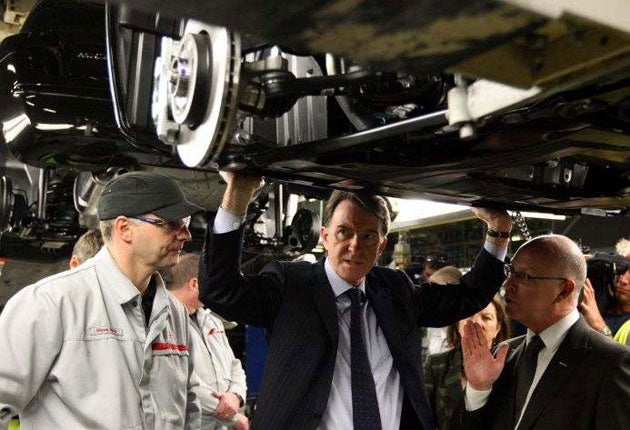Wheels come off the great British motor industry
Production to fall below one million vehicles this year for the first time since 1984

Britain's beleaguered car- makers are on course to build fewer than one million vehicles this year for the first time in a quarter of a century.
The extent of the crisis in the industry was laid bare yesterday as motor manufacturers announced 59,777 cars were built in February, a 59 per cent drop since last year and the largest fall on record. Just 121,181 cars left British factories in January and February, compared with 294,467 in the first two months of 2008.
With motor experts warning that the industry is unlikely to recover until spring 2010, British car firms are set to produce as few as 900,000 vehicles this year. The last time numbers fell so low was in 1984, when 908,906 cars rolled off production lines.
Industry sources said the pain was spread across all types of companies, from luxury manufacturers to makers of economy saloon cars. The collapse in demand both at home – where car sales have fallen by almost half – and abroad has led to desperate measures by car-makers.
Honda – which built 120,150 CR-Vs and 110,273 Civics at its Swindon factory last year – is closing the plant until June, but is retaining staff by continuing to pay them. Its total production of 230,423 cars last year was only slightly down on 237,772 in 2007, but it took the emergency closure action as sales began to slump at the end of last year.
Jaguar Land Rover, which has imposed a four-day week and a pay freeze on staff, saw production tumble from 232,548 in 2007 to 184,831 last year. Toyota's British output dropped from 277,825 to 213,329 cars last year, with production of the Avensis – built in Burnaston, Derbyshire, falling from 145,669 to 110,741 in 2008. The company has cut pay and hours by10 per cent.
Only Nissan bucked the trend, building 386,555 cars in Britain, compared with 353,718 the year before. Production of the Qashqai, constructed in Sunderland, soared from 164,191 to 224,989. But even Nissan – which was visited yesterday by Lord Mandelson, the Business Secretary – has shed 1,200 jobs.
The grim monthly production figures – the biggest fall on record – were disclosed by the Society of Motor Manufacturers and Traders (SMMT), which issued a fresh appeal for help from the Government. It is calling for a subsidy for short-time working and the introduction of a "scrappage" incentive scheme to encourage motorists to trade in old cars.
Paul Everitt, the SMMT chief executive, said: "We are effectively in a battle for survival now. The level of demand is a major, major problem."
Tom Donnelly, a professor of automotive business at Coventry University, forecast British production would fall below one million on current trends. He said: "The situation is very serious and I can only see a lot of further reductions in the industry. The Government needs to ensure the industry gets sufficient working capital to ride it through. If you don't keep the industry on a life-support machine, there will be very little left."
The statistics for commercial vehicle production in February were even worse, recording a 72 per cent slump since the previous year.
The figures came the day after the SMMT announced that the 2010 British International Motor Show would be cancelled because of the recession.
The Department for Business, Enterprise and Regulatory Reform confirmed that no state cash had yet started rolling to the motor manufacturers, but added that several applications for help were in the pipeline.
Lord Mandelson said yesterday: "The car manufacturers, their huge supply chain, are a cornerstone of our manufacturing sector. They employ very, very many people, so their survival is important, and they will survive, they will thrive in the future, as long as they make the right decisions now."
Join our commenting forum
Join thought-provoking conversations, follow other Independent readers and see their replies
Comments
Bookmark popover
Removed from bookmarks